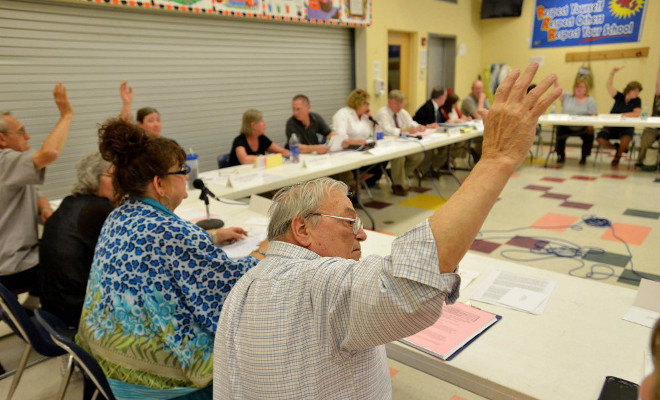The Maine Wire carried another of our commentaries recently, which we post here for you in full. We’ll follow with other content and related observations.
===================================================================

http://www.themainewire.com/2016/05/bring-accountability-public-schools/
“When school children start paying union dues, that’s when I’ll start representing the interests of school children.” – Albert Shanker – President of the United Federation of Teachers [1964-1984] & the American Federation of Teachers [1974-1997]
(There is some dispute over whether Shanker actually said this, but there is no arguing with the thought. To think otherwise would be to believe that United Auto Worker union members organized to advocate for the interests of American car buyers.)
In the last week of April, 2016, Dr. Bill Beardsley of the Maine Department of Education spoke on education policy at the MHPC luncheons in Portland and Auburn.
During the Q&A period that followed his remarks at each event, it was observed that while there are numerous organized professional groups that advocate for adults in the school establishments, yet there is not a single one that advocates “for the children,” otherwise known as the students, and their parents or guardians.
At the state level, we have the Maine Municipal Association, the Maine Education Association (the teachers union), the Maine School Management Association, the Maine School Board Association, and the Maine School Superintendents Association. Nationally, there are the American Federation of Teachers and the National Education Association, both of which are teachers unions. Who knows how many others there might be working the hallways of their respective state capitols and the US Capitol in Washington.
The only opposing force I can recall is one that was formed by Michelle Rhee some years back called “Students First.” Michelle was a uniquely courageous and principled school administrator appointed to the position of Chancellor of the Washington, D.C. public school system, widely recognized as one of the absolute worst in the country.
As Michelle began working to reform the system, she inescapably found herself getting cross-wise with the teachers themselves, entrenched school administrators, and numerous members of the public and District government. Embarrassment on a major scale was a regular occurrence, and this could not be countenanced. Ms. Rhee “resigned” her position after only three years when the mayor who appointed her was thrown out of office, largely on the basis of her aggressive approach to fixing things. Shortly afterwards, she announced she would be forming a national group to advocate for the students.
Reflecting on the luncheon discussion, I began to ruminate on school system accountability. Here in Brunswick, the school budget represents approximately $37 million of total municipal expenditures of roughly $60 million, or more than 60% of total spending in spite of the fact that school enrollment has significantly declined in recent years.
I pay $700 a month in property taxes, for which the ONLY directly provided municipal services are trash collection (plus ‘pay per bag’ charges) and winter road maintenance. The 13 houses on my rural lane pay roughly $10,000 per month in property taxes. Out of the 13, only three have school-age children, and one of those sends their children to private school.

Given those details, I began to ponder ways in which local citizens might begin to push for greater accountability and transparency in their individual school systems. For a few microseconds, I considered approaching a supportive legislator in Augusta to talk about developing and sponsoring legislation that would require this. Given the teachers union and education lobbyists strangle hold on the hallways of our Capitol, I threw cold water on that idea, knowing it had an ice cube’s chance in Death Valley.
The only chance to make headway, I’m afraid, is to work the situation locally, which is likewise a tremendous uphill challenge. So here are some thoughts for discussion on what such a proposal might look like.
To begin with, school unit management (the superintendent and key staff) and the school board chair should be required to make an annual report to the municipal governing body and town citizens in a scheduled, public briefing roughly 3 months before approval of the budget for the coming year. This meeting should be well advertised, and scheduled to accommodate the majority of town residents; not during typical business/working hours.
The following components, as a minimum, should be included in their report:
- A ten-year financial summary showing total budget amounts; school specific mil-rate and total mil-rate; total enrollment; total spending per-student; teaching staff head-count and total head-count; and reserve fund balances.
- Summary status of employment contracts and negotiations underway or upcoming. Include head count for health, social worker & counseling staff.
- Total cost of free/reduced price meal service, and total student count receiving such service.
- Enrollment projections in use for planning purposes.
- A detailed review of the physical assets belonging to the school unit and/or used by the school unit, including all educational buildings and attached real estate with related recreation provisions, school buses, and any other assets under use for education purposes.
- Age and known status of assets
- Known items of deferred maintenance; upcoming needs
- Plans for new construction, major renovations, and other capital expenditures
- Status of all major systems: heating, ventilating, air conditioning, electrical, plumbing, food prep/service
- A five-year summary of all measures of student performance and teacher performance that shows trends in each
- Projected budget levels and capital expenditures for the next five years
In conclusion, it’s safe to say that taking on the extremely powerful education lobby with legislative initiatives is a fools’ errand. They’re a major source of donations supporting political campaigns, and there is no hope of countering the money they spend, which of course, derives from taxpayers.
I want to think that a better informed town council and public, especially when year-to-year trends are reported on, will eventually lead to more rigorous oversight and involvement in school system decision making. Especially when combined with those responsible having to get up in front of their sponsors to advocate for their spending and what it buys.
Perhaps eye to eye contact at a very personal level can have a transformational effect.
====================================================================
And some say we don’t have a drop of optimism left in our bones. Contrast the above with this recent item in the Forecaster:
http://www.theforecaster.net/brunswick-council-cuts-school-budget-board-member-fires-back/

and the glowing countenance of Rich “Numbers” Ellis that appears in the article. Ellis has years of practice fire-hosing town councilors, the press, and your correspondent with numerically rich floods in response to any challenge to school department funding.
Note, by the way, how the referenced article, and others linked in the body of the item, scrupulously avoid giving total budget figures in specific detail. So we had to go in search of them on your behalf.
Frank Lee, each year as we review these events, it gets tougher and tougher to stop the bleeding in our eyes. This is our twentieth year of watching and absorbing the annual Kabuki theater put on by the town council, and in particular, the choreography they use whenever the school department is on the stage with them.
Every single member of the council we can recall over these decades is terrified of challenging the school budget, the school board, and the school department in any regard. Now that we mention it, the same is true of every school board member we can recall over the same time frame.
We had high hopes a few years back when Billy Thompson joined the school board and then became chair, but we should have known better. Ellis and the others drew upon an endless supply of kool-aid, and soon whatever reform ideas Billy might have had were tossed out the window, and the same-old, same-old prevailed, if not more-so.
Oh sure, the council looks at the roughly $38 million school budget proposal and viciously asks that perhaps 1% or so be ‘slashed’ from the request, putting the entire school system at risk.
Yeah, right. If there’s anything you can be sure of, readers, it’s that the school department has mastered the art of submitting a budget that includes ‘something to leave on the table’ so the drama of highly motivated town councilors watching out for local taxpayers can play out. We’d even go so far at this point to suggest that the amounts to be bandied about in public are agreed upon ahead of time, along with semi-scripted comments to be offered up on camera and for press consumption. Why risk losing control?
To think otherwise would be so naive as to be laughable. And you can search far and wide to find evidence of any questions of accountability found in our opening commentary above. Ain’t gonna happen; “it’s for the children,” and anyone who thinks otherwise risks public humiliation, or worse.
To further our disgust with how things work around here, we refer you to this link:
http://www.brunswickme.org/wp-content/uploads/2011/12/2016-2017-BudgSumm-PH.pdf
This is Mr. Manager’s briefing to the public hearing on the budget less than two weeks ago.
The above screen snip may be a bit difficult to read, but we call your attention to the “Education” lines. Note that the amount actually spent by the school department in FY15 (2014-15) was $33.391 million. The approved budget for the following year (FY16) was $36.526 million, and until figures roll in some time from now, this is the best available. Actuals won’t be publicized in time to have any real effect on our knowledge base.
No matter; the difference was $3.135 million, or an increase of well over $1300 per student, of which there were roughly 1000 less than the peak enrollment in FY05.
So FY16 budget/available is up by 9.4% over FY15 actual expenditures. Compare this to the tentatively approved budget for the coming school year – FY17 – of $37.7 million. This is $4.3 million more than actual spending two years earlier, for an increase of 3.3% over the present year, and 13% over actuals two years ago. Since enrollment continues to decline, these increases should be, we say SHOULD BE, especially troubling
But not if you’re deathly afraid of challenging the conduct of the school department, which it’s clear is the case.
BTW, to give some sense of perspective to the figures here, the proposed budget for the coming year includes $665,000 for street resurfacing. This resurfaces just under 3 miles of town streets. If you are even barely conscious as you go about your daily business in town, you know our streets are in horrible shape, and we should be spending much more than this to keep things in basic repair.
The total annual budget is in the $60 million range, so our streets get 1% or so of our spending. If you think that’s the right amount to spend on maintaining basic paved infrastructure, we won’t ever agree. The article above points out that a figure in the same range is thrown on the table as chump change in school department v. town council budget deliberations.
We’re offended, and you should be too.
But we both know it won’t make a dimes worth of difference. Just wait until the reveluation is complete; let’s see what your reaction is then.


No comments:
Post a Comment